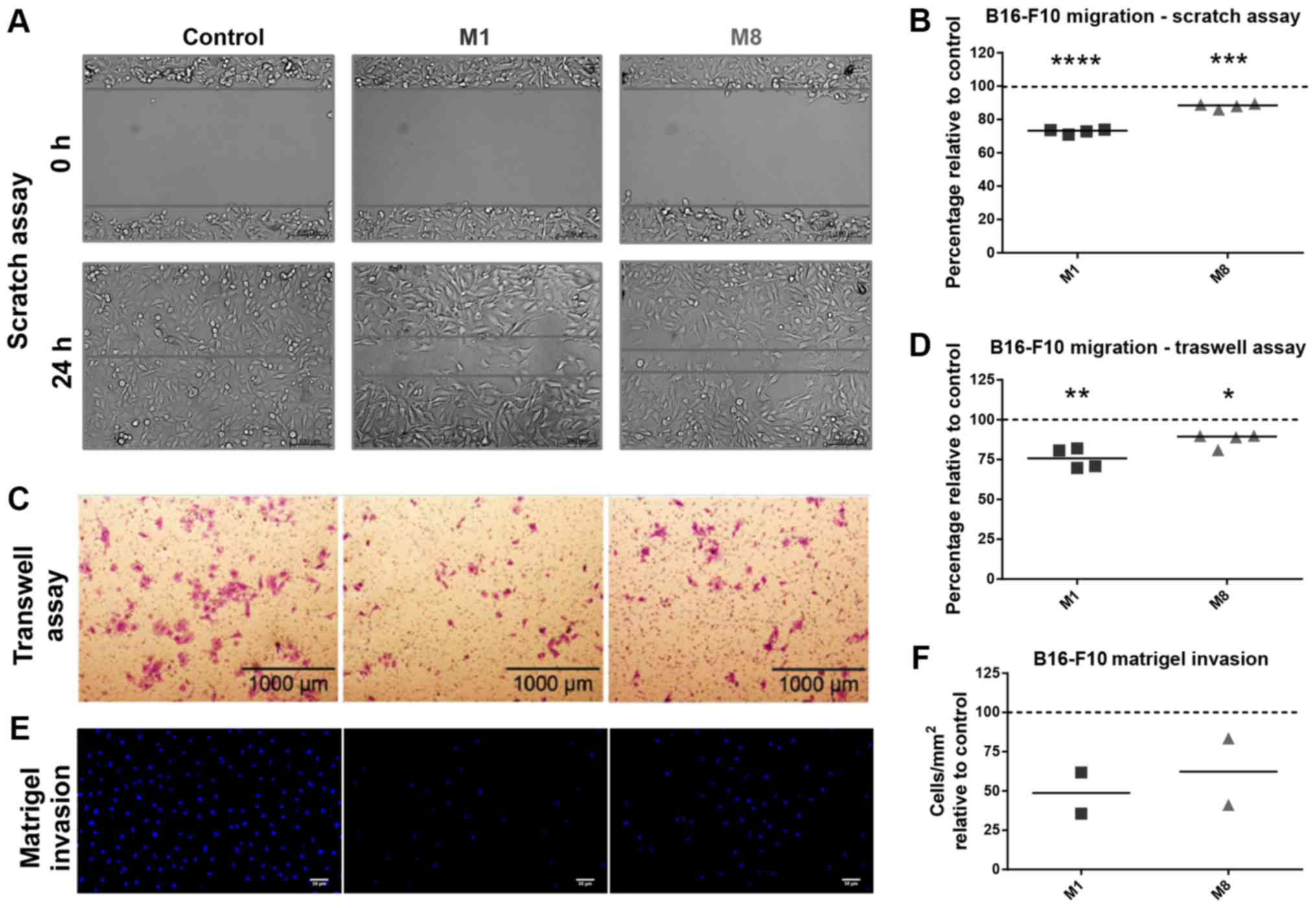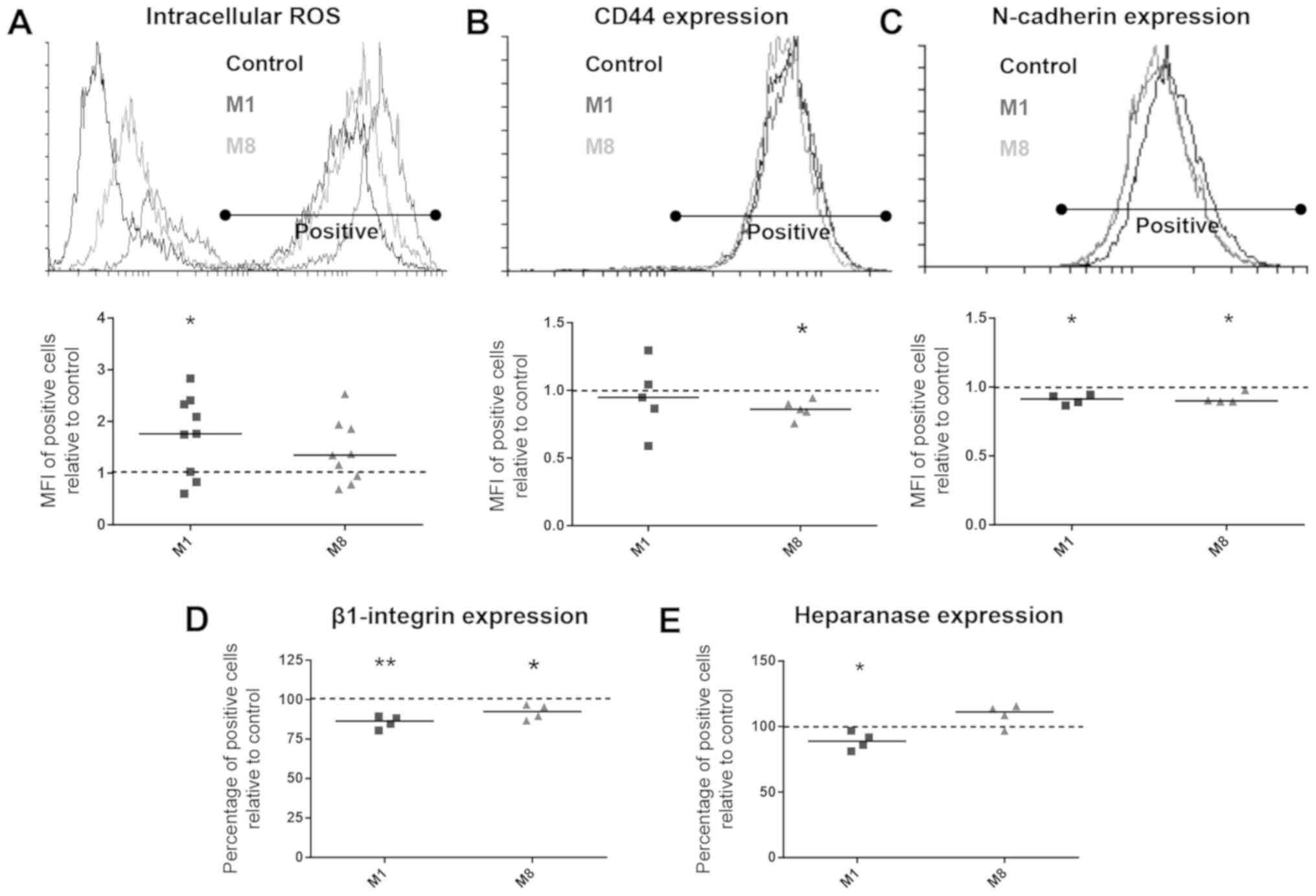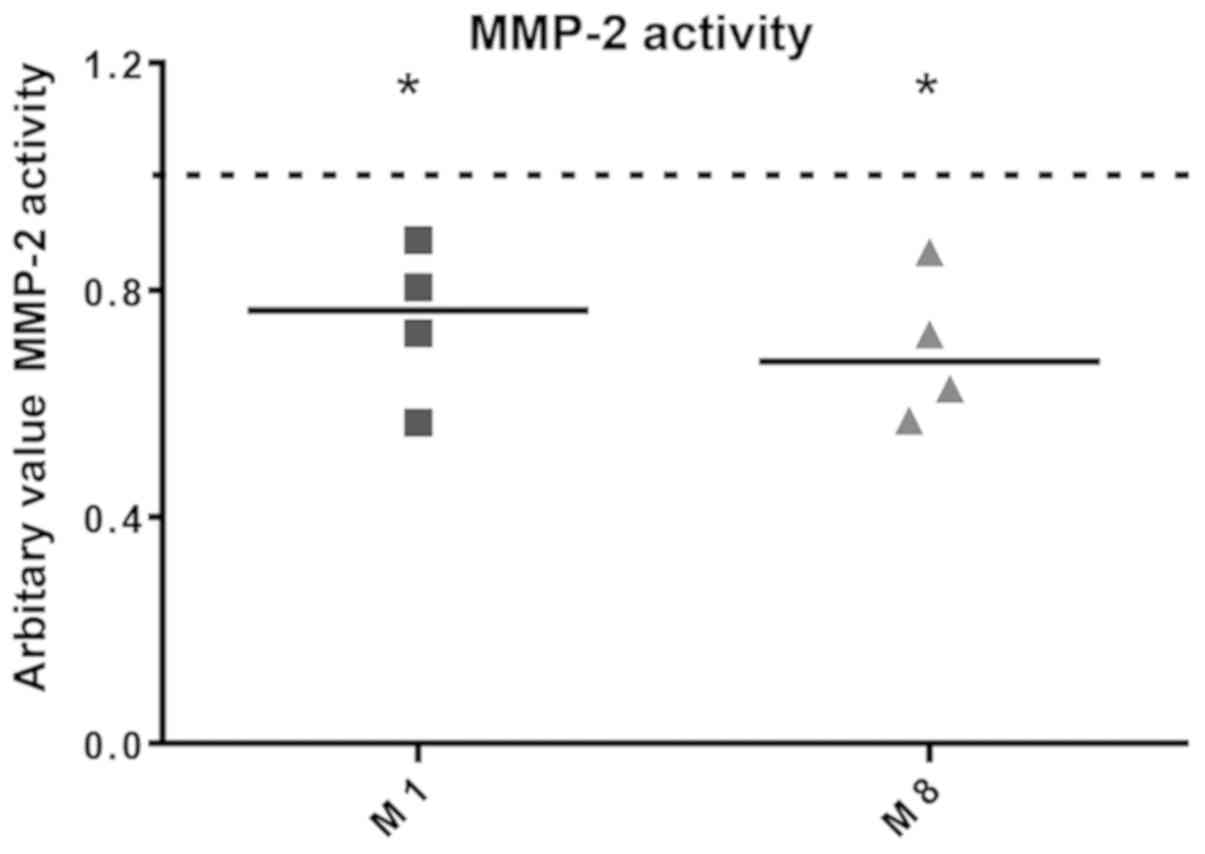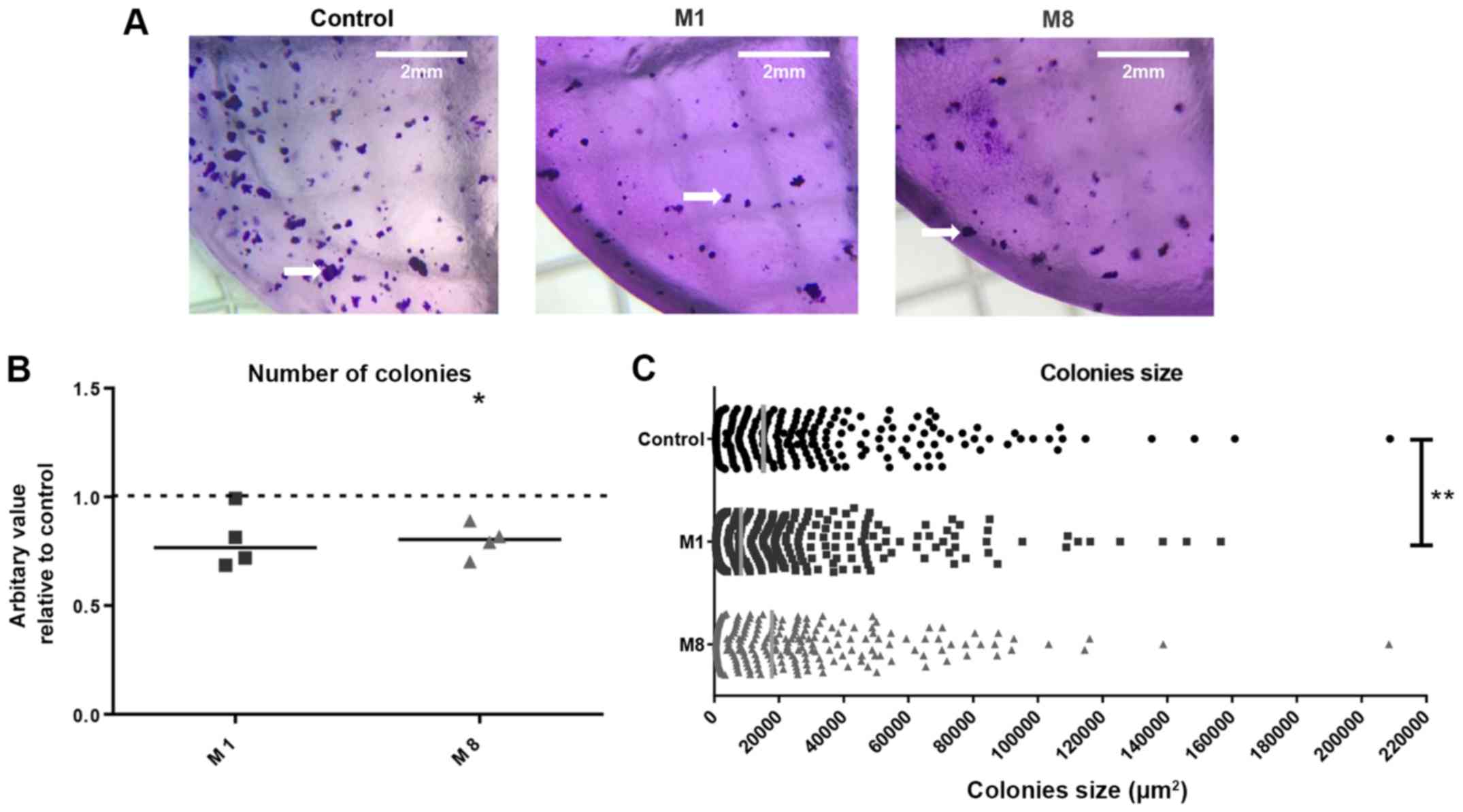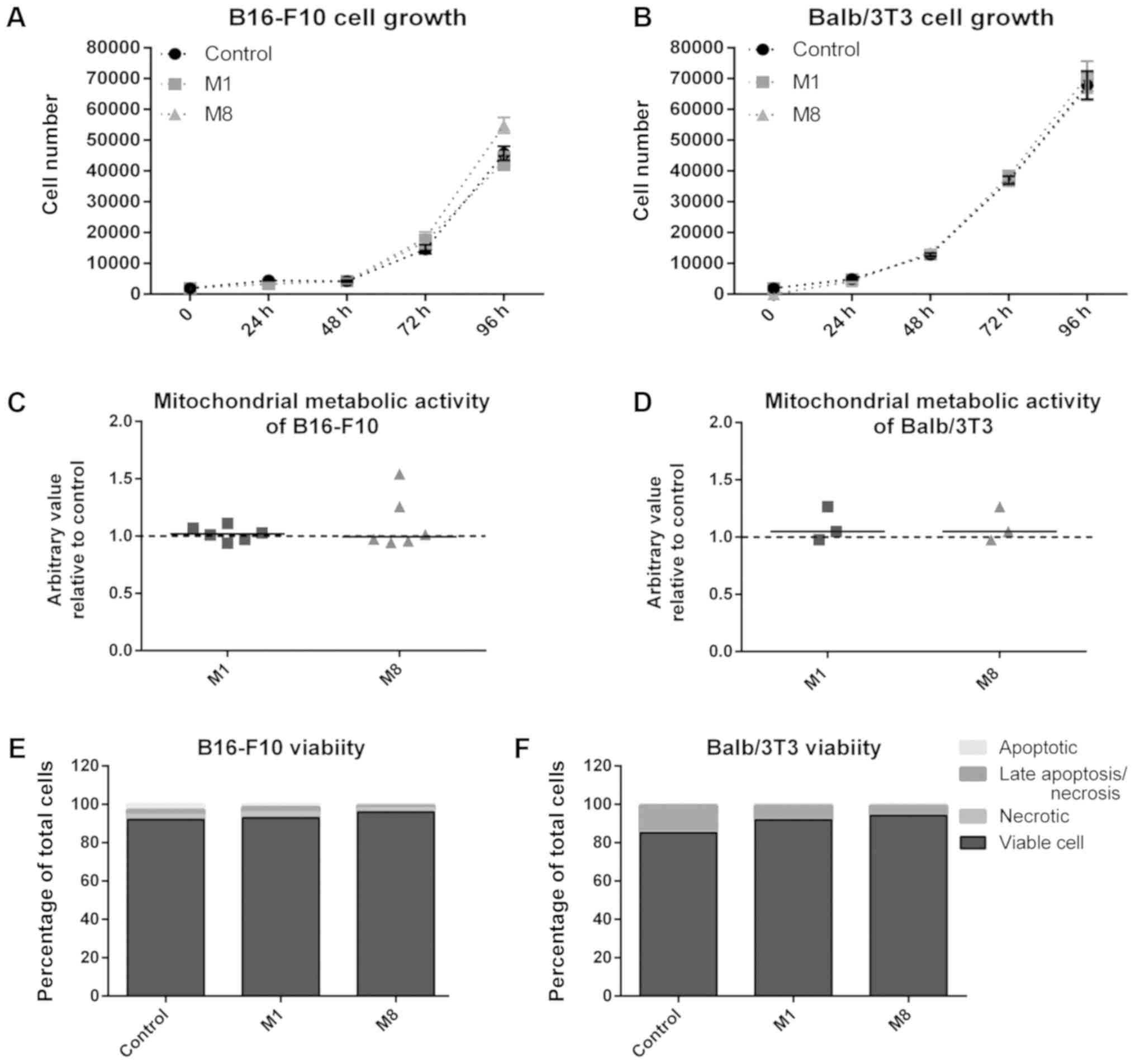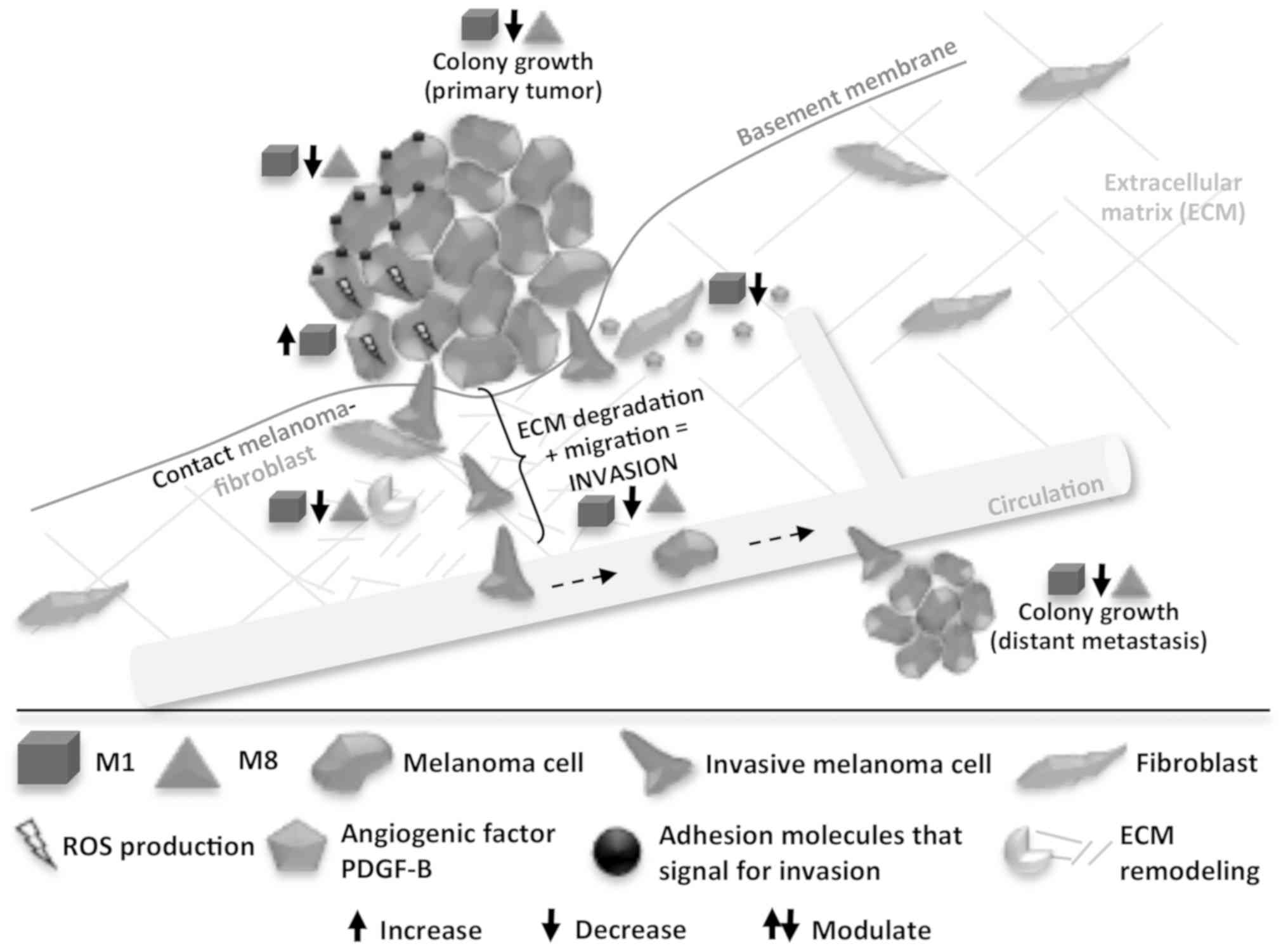|
1
|
Torre LA, Bray F, Siegel RL, Ferlay J,
Lortet-Tieulent J and Jemal A: Global cancer statistics, 2012. CA
Cancer J Clin. 65:87–108. 2015. View Article : Google Scholar : PubMed/NCBI
|
|
2
|
Lomas A, Leonardi-Bee J and Bath-Hextall
F: A systematic review of worldwide incidence of nonmelanoma skin
cancer. Br J Dermatol. 166:1069–1080. 2012. View Article : Google Scholar : PubMed/NCBI
|
|
3
|
Guy GP Jr, Thomas CC, Thompson T, Watson
M, Massetti GM and Richardson LC; Centers for Disease Control and
Prevention (CDC): Vital signs: Melanoma incidence and mortality
trends and projections - United States, 1982-2030. MMWR Morb Mortal
Wkly Rep. 64:591–596. 2015.PubMed/NCBI
|
|
4
|
American Cancer Society: Survival Rates
for Melanoma Skin Cancer, by Stage. American Cancer Society;
Atlanta, GA: 2017, https://www.cancer.org/cancer/melanoma-skin-cancer/detection-diagnosis-staging/survival-rates-for-melanoma-skin-cancer-by-stage.html.
Accessed February 1, 2019.
|
|
5
|
Maverakis E, Cornelius LA, Bowen GM, Phan
T, Patel FB, Fitzmaurice S, He Y, Burrall B, Duong C, Kloxin AM, et
al: Metastatic melanoma - A review of current and future treatment
options. Acta Derm Venereol. 95:516–524. 2015. View Article : Google Scholar
|
|
6
|
American Cancer Society Skin Cancer:
American Cancer Society, Inc.; Atlanta, GA: 2016, http://www.cancer.org/cancer/cancercauses/sunanduvexposure/skin-cancer-facts
Accessed May 10 , 2018.
|
|
7
|
Ryu SH, Heo SH, Park EY, Choi KC, Ryu JW,
Lee SH and Lee SW: Selumetinib inhibits melanoma metastasis to
mouse liver via suppression of EMT-targeted genes. Anticancer Res.
37:607–614. 2017. View Article : Google Scholar : PubMed/NCBI
|
|
8
|
Sadhu SS, Wang S, Averineni RK, Seefeldt
T, Yang Y and Guan X: In-vitro and in-vivo inhibition of melanoma
growth and metastasis by the drug combination of celecoxib and
dacarbazine. Melanoma Res. 26:572–579. 2016. View Article : Google Scholar : PubMed/NCBI
|
|
9
|
Ibrahim N and Haluska FG: Molecular
pathogenesis of cutaneous melanocytic neoplasms. Annu Rev Pathol.
4:551–579. 2009. View Article : Google Scholar : PubMed/NCBI
|
|
10
|
Luke JJ, Flaherty KT, Ribas A and Long GV:
Targeted agents and immunotherapies: Optimizing outcomes in
melanoma. Nat Rev Clin Oncol. 14:463–482. 2017. View Article : Google Scholar : PubMed/NCBI
|
|
11
|
Luo C and Shen J: Research progress in
advanced melanoma. Cancer Lett. 397:120–126. 2017. View Article : Google Scholar : PubMed/NCBI
|
|
12
|
Eggermont AM and Robert C: New drugs in
melanoma: It's a whole new world. Eur J Cancer. 47:2150–2157. 2011.
View Article : Google Scholar : PubMed/NCBI
|
|
13
|
Hanahan D and Weinberg RA: The hallmarks
of cancer. Cell. 100:57–70. 2000. View Article : Google Scholar : PubMed/NCBI
|
|
14
|
Melis C, Rogiers A, Bechter O and van den
Oord JJ: Molecular genetic and immunotherapeutic targets in
metastatic melanoma. Virchows Arch. 471:281–293. 2017. View Article : Google Scholar : PubMed/NCBI
|
|
15
|
Workman P, Draetta GF, Schellens JH and
Bernards R: How much longer will we put up with $100,000 cancer
drugs? Cell. 168:579–583. 2017. View Article : Google Scholar : PubMed/NCBI
|
|
16
|
World Health Organization: WHO Traditional
Medicine Strategy: 2014-2023. WHO Press; Geneva: pp. 762013
|
|
17
|
Ghosh S, Sikdar S, Mukherjee A and
Khuda-Bukhsh AR: Evaluation of chemopreventive potentials of
ethanolic extract of Ruta graveolens against A375 skin melanoma
cells in vitro and induced skin cancer in mice in vivo. J Integr
Med. 13:34–44. 2015. View Article : Google Scholar : PubMed/NCBI
|
|
18
|
Mondal J, Samadder A and Khuda-Bukhsh AR:
Psorinum 6× triggers apoptosis signals in human lung cancer cells.
J Integr Med. 14:143–153. 2016. View Article : Google Scholar : PubMed/NCBI
|
|
19
|
Sikdar S, Kumar Saha S and Rahman
Khuda-Bukhsh A: Relative apoptosis-inducing potential of
homeopa-thic Condurango 6C and 30C in H460 lung cancer cells in
vitro: -Apoptosis-induction by homeopathic Condurango in H460
cells. J Pharmacopuncture. 17:59–69. 2014. View Article : Google Scholar
|
|
20
|
Saha SK, Roy S and Khuda-Bukhsh AR:
Ultra-highly diluted plant extracts of Hydrastis canadensis and
Marsdenia condurango induce epigenetic modifications and alter gene
expression profiles in HeLa cells in vitro. J Integr Med.
13:400–411. 2015. View Article : Google Scholar : PubMed/NCBI
|
|
21
|
Arora S and Tandon S: DNA fragmentation
and cell cycle arrest: A hallmark of apoptosis induced by Ruta
graveolens in human colon cancer cells. Homeopathy. 104:36–47.
2015. View Article : Google Scholar : PubMed/NCBI
|
|
22
|
Khuda-Bukhsh AR: Modulation of TERT and
Top II activities by the homeopathic nosode, Hep C 30 in
demonstrating its anticancer potential against Hep G2 liver cancer
cells: A commentary on one of our Published Research Anisur. BAOJ
Med Nurs. 4:22018.
|
|
23
|
da Saúde Ministério: Política Nacional de
Práticas Integrativas e Complementares no SUS. 2nd edition.
Biblioteca Virtual em Saúde do Ministério da Saúde; Brasil: pp.
982015, In Portuguese.
|
|
24
|
de Oliveira CC, de Oliveira SM, Godoy LM,
Gabardo J and Buchi DF: Canova, a Brazilian medical formulation,
alters oxidative metabolism of mice macrophages. J Infect.
52:420–432. 2006. View Article : Google Scholar : PubMed/NCBI
|
|
25
|
Abud AP, Cesar B, Cavazzani LF, de
Oliveira CC, Gabardo J and Buchi DF: Activation of bone marrow
cells treated with Canova in vitro. Cell Biol Int. 30:808–816.
2006. View Article : Google Scholar : PubMed/NCBI
|
|
26
|
Lopes L, Godoy LM, de Oliveira CC, Gabardo
J, Schadeck RJ and de Freitas Buchi D: Phagocytosis,
endosomal/lysosomal system and other cellularaspects of macrophage
activation by Canova medication. Micron. 37:277–287. 2006.
View Article : Google Scholar
|
|
27
|
Cesar B, Abud AP, de Oliveira CC, Cardoso
F, Gremski W, Gabardo J and Buchi DF: Activation of mononuclear
bone marrow cells treated in vitro with a complex homeopathic
medication. Micron. 39:461–470. 2008. View Article : Google Scholar
|
|
28
|
Guimarães FS, Abud AP, Oliveira SM,
Oliveira CC, César B, Andrade LF, Donatti L, Gabardo J, Trindade ES
and Buchi DF: Stimulation of lymphocyte anti-melanoma activity by
co-cultured macrophages activated by complex homeopathic
medication. BMC Cancer. 9:2932009. View Article : Google Scholar : PubMed/NCBI
|
|
29
|
de Oliveira CC, Abud AP, de Oliveira SM,
Guimarães FS, de Andrade LF, Di Bernardi RP, Coletto EL, Kuczera D,
Da Lozzo EJ, Gonçalves JP, et al: Developments on drug discovery
and on new therapeutics: Highly diluted tinctures act as biological
response modifiers. BMC Complement Altern Med. 11:1012011.
View Article : Google Scholar : PubMed/NCBI
|
|
30
|
de Oliveira SM, de Oliveira CC, Abud AP,
Guimarães FS, Di Bernardi RP, Coletto EL and Buchi DF: Mercurius
solubilis: Actions on macrophages. Homeopathy. 100:228–236. 2011.
View Article : Google Scholar : PubMed/NCBI
|
|
31
|
Gonçalves JP, Dos Santos MLF, Rossi GR,
Costa Gagosian VS and de Oliveira CC: Differential effects of
Zincum metallicum on cell models. Homeopathy. 106:171–180. 2017.
View Article : Google Scholar : PubMed/NCBI
|
|
32
|
Sato DY, Wal R, de Oliveira CC, Cattaneo
RII, Malvezzi M, Gabardo J and Buchi DF: Histopathological and
immunopheno-typing studies on normal and sarcoma 180-bearing mice
treated with a complex homeopathic medication. Homeopathy.
94:26–32. 2005. View Article : Google Scholar : PubMed/NCBI
|
|
33
|
de Oliveira CC, de Oliveira SM, Goes VM,
Probst CM, Krieger MA and Buchi DF: Gene expression profiling of
macrophages following mice treatment with an immunomodulator
medication. J Cell Biochem. 104:1364–1377. 2008. View Article : Google Scholar : PubMed/NCBI
|
|
34
|
Cesar B, Abud AP, de Oliveira CC, Cardoso
F, Bernardi RP, Guimarães FS, Gabardo J and de Freitas Buchi D:
Treatment with at homeopathic complex medication modulates
mononuclear bone marrow cell differentiation. Evid Based Complement
Alternat Med. 2011:2124592011. View Article : Google Scholar :
|
|
35
|
Ferrari de Andrade L, Mozeleski B, Leck
AR, Rossi G, da Costa CR, de Souza Fonseca, Guimarães F, Zotz R,
Fialho do Nascimento K, Camargo de Oliveira C, de Freitas Buchi D,
et al: Inhalation therapy with M1 inhibits experimental melanoma
development and metastases in mice. Homeopathy. 105:109–118. 2016.
View Article : Google Scholar : PubMed/NCBI
|
|
36
|
Guimarães FS, Andrade LF, Martins ST, Abud
AP, Sene RV, Wanderer C, Tiscornia I, Bollati-Fogolín M, Buchi DF
and Trindade ES: In vitro and in vivo anticancer properties of a
Calcarea carbonica derivative complex (M8) treatment in a murine
melanoma model. BMC Cancer. 10:1132010. View Article : Google Scholar : PubMed/NCBI
|
|
37
|
Lambert AW, Pattabiraman DR and Weinberg
RA: Emerging Biological Principles of Metastasis. Cell.
168:670–691. 2017. View Article : Google Scholar : PubMed/NCBI
|
|
38
|
Hanahan D and Weinberg RA: Hallmarks of
cancer: The next generation. Cell. 144:646–674. 2011. View Article : Google Scholar : PubMed/NCBI
|
|
39
|
Kam Y, Rejniak KA and Anderson AR:
Cellular modeling of cancer invasion: Integration of in silico and
in vitro approaches. J Cell Physiol. 227:431–438. 2012. View Article : Google Scholar
|
|
40
|
Hanahan D and Coussens LM: Accessories to
the crime: Functions of cells recruited to the tumor
microenvironment. Cancer Cell. 21:309–322. 2012. View Article : Google Scholar : PubMed/NCBI
|
|
41
|
Balkwill FR, Capasso M and Hagemann T: The
tumor microenvironment at a glance. J Cell Sci. 125:5591–5596.
2012. View Article : Google Scholar
|
|
42
|
Kalluri R: The biology and function of
fibroblasts in cancer. Nat Rev Cancer. 16:582–598. 2016. View Article : Google Scholar : PubMed/NCBI
|
|
43
|
Bogenrieder T and Herlyn M: Axis of evil:
Molecular mechanisms of cancer metastasis. Oncogene. 22:6524–6536.
2003. View Article : Google Scholar : PubMed/NCBI
|
|
44
|
Lima LF, Rocha RM, Duarte AB, Brito IR,
Silva GM, Rodrigues GQ, Nunes-Pinheiro DC, Sales AD, Moura AA,
Wheeler MB, et al: Unexpected effect of the vehicle (grain ethanol)
of homeopathic FSH on the in vitro survival and development of
isolated ovine preantral follicles. Microsc Res Tech. 80:406–418.
2017. View Article : Google Scholar
|
|
45
|
Chirumbolo S and Bjørklund G: Homeopathic
potencies of Arnica montana L. change gene expression in a
Tamm-Horsfall protein-1 cell line in vitro model: The role of
ethanol as a possible confounder and statistical bias. J Integr
Med. 15:255–264. 2017. View Article : Google Scholar : PubMed/NCBI
|
|
46
|
Young L, Sung J, Stacey G and Masters JR:
Detection of Mycoplasma in cell cultures. Nat Protoc. 5:929–934.
2010. View Article : Google Scholar : PubMed/NCBI
|
|
47
|
Justus CR, Leffler N, Ruiz-Echevarria M
and Yang LV: In vitro cell migration and invasion assays. J Vis
Exp. 88:e510462014.
|
|
48
|
Eruslanov E and Kusmartsev S:
Identification of ROS using oxidized DCFDA and flow-cytometry.
Methods Mol Biol. 594:57–72. 2010. View Article : Google Scholar : PubMed/NCBI
|
|
49
|
Martins JR, Passerotti CC, Maciel RM,
Sampaio LO, Dietrich CP and Nader HB: Practical determination of
hyaluronan by a new noncompetitive fluorescence-based assay on
serum of normal and cirrhotic patients. Anal Biochem. 319:65–72.
2003. View Article : Google Scholar : PubMed/NCBI
|
|
50
|
Vandesompele J, De Preter K, Pattyn F,
Poppe B, Van Roy N, De Paepe A and Speleman F: Accurate
normalization of real-time quantitative RT-PCR data by geometric
averaging of multiple internal control genes. Genome Biol. Jun
18–2002.Epub ahead of print. View Article : Google Scholar : PubMed/NCBI
|
|
51
|
Toth M and Fridman R: Assessment of
gelatinases (MMP-2 and MMP-9 by gelatin zymography. Methods Mol
Med. 57:163–174. 2001.PubMed/NCBI
|
|
52
|
Bonnekoh B, Wevers A, Jugert F, Merk H and
Mahrle G: Colorimetric growth assay for epidermal cell cultures by
their crystal violet binding capacity. Arch Dermatol Res.
281:487–490. 1989. View Article : Google Scholar : PubMed/NCBI
|
|
53
|
Mosmann T: Rapid colorimetric assay for
cellular growth and survival: Application to proliferation and
cytotoxicity assays. J Immunol Methods. 65:55–63. 1983. View Article : Google Scholar : PubMed/NCBI
|
|
54
|
Schneider CA, Rasband WS and Eliceiri KW:
NIH Image to ImageJ: 25 years of image analysis. Nat Methods.
9:671–675. 2012. View Article : Google Scholar : PubMed/NCBI
|
|
55
|
Terho P: Flowing Software. Turku Centre
for Biotechnology. 2013, http://flowingsoftware.btk.fi/index.php?page=1.
|
|
56
|
Kuphal S, Bauer R and Bosserhoff A-K:
Integrin signaling in malignant melanoma. Cancer Metastasis Rev.
24:195–222. 2005. View Article : Google Scholar : PubMed/NCBI
|
|
57
|
Li G, Satyamoorthy K and Herlyn M:
N-cadherin-mediated intercellular interactions promote survival and
migration of melanoma cells. Cancer Res. 61:3819–3825.
2001.PubMed/NCBI
|
|
58
|
Dietrich A, Tanczos E, Vanscheidt W,
Schöpf E and Simon JC: High CD44 surface expression on primary
tumours of malignant melanoma correlates with increased metastatic
risk and reduced survival. Eur J Cancer. 33:926–930. 1997.
View Article : Google Scholar : PubMed/NCBI
|
|
59
|
Herraiz C, Crosas-Molist E and Sanz-Moreno
V: Reactive oxygen species and tumor dissemination: Allies no
longer. Mol Cell Oncol. 3:e11273132016. View Article : Google Scholar : PubMed/NCBI
|
|
60
|
Sironen RK, Tammi M, Tammi R, Auvinen PK,
Anttila M and Kosma VM: Hyaluronan in human malignancies. Exp Cell
Res. 317:383–391. 2011. View Article : Google Scholar
|
|
61
|
Bonnans C, Chou J and Werb Z: Remodelling
the extracellular matrix in development and disease. Nat Rev Mol
Cell Biol. 15:786–801. 2014. View Article : Google Scholar : PubMed/NCBI
|
|
62
|
Hofmann UB, Westphal JR, Zendman AJW,
Becker JC, Ruiter DJ and van Muijen GN: Expression and activation
of matrix metallo-proteinase-2 (MMP-2) and its co-localization with
membrane-type 1 matrix metalloproteinase (MT1-MMP) correlate with
melanoma progression. J Pathol. 191:245–256. 2000. View Article : Google Scholar : PubMed/NCBI
|
|
63
|
Kurschat P, Wickenhauser C, Groth W, Krieg
T and Mauch C: Identification of activated matrix
metalloproteinase-2 (MMP-2) as the main gelatinolytic enzyme in
malignant melanoma by in situ zymography. J Pathol. 197:179–187.
2002. View Article : Google Scholar : PubMed/NCBI
|
|
64
|
Voelcker V, Gebhardt C, Averbeck M,
Saalbach A, Wolf V, Weih F, Sleeman J, Anderegg U and Simon J:
Hyaluronan fragments induce cytokine and metalloprotease
upregulation in human melanoma cells in part by signalling via
TLR4. Exp Dermatol. 17:100–107. 2008. View Article : Google Scholar
|
|
65
|
Sanderson RD, Yang Y, Kelly T, MacLeod V,
Dai Y and Theus A: Enzymatic remodeling of heparan sulfate
proteoglycans within the tumor microenvironment: Growth regulation
and the prospect of new cancer therapies. J Cell Biochem.
96:897–905. 2005. View Article : Google Scholar : PubMed/NCBI
|
|
66
|
Nakajima M, DeChavigny A, Johnson CE,
Hamada J, Stein CA and Nicolson GL: Suramin. A potent inhibitor of
melanoma heparanase and invasion. J Biol Chem. 266:9661–9666.
1991.PubMed/NCBI
|
|
67
|
Herlyn M and Shih IM: Interactions of
melanocytes and melanoma cells with the microenvironment. Pigment
Cell Res. 7:81–88. 1994. View Article : Google Scholar : PubMed/NCBI
|
|
68
|
Willenberg A, Saalbach A, Simon JC and
Anderegg U: Melanoma cells control HA synthesis in peritumoral
fibroblasts via PDGF-AA and PDGF-CC: Impact on melanoma cell
proliferation. J Invest Dermatol. 132:385–393. 2012. View Article : Google Scholar
|
|
69
|
Forsberg K, Valyi-Nagy I, Heldin CH,
Herlyn M and Westermark B: Platelet-derived growth factor (PDGF) in
oncogenesis: Development of a vascular connective tissue stroma in
xenotransplanted human melanoma producing PDGF-BB. Proc Natl Acad
Sci USA. 90:393–397. 1993. View Article : Google Scholar : PubMed/NCBI
|
|
70
|
Abramsson A, Lindblom P and Betsholtz C:
Endothelial and nonendothelial sources of PDGF-B regulate pericyte
recruitment and influence vascular pattern formation in tumors. J
Clin Invest. 112:1142–1151. 2003. View Article : Google Scholar : PubMed/NCBI
|
|
71
|
Kroemer G, Galluzzi L, Vandenabeele P,
Abrams J, Alnemri ES, Baehrecke EH, Blagosklonny MV, El-Deiry WS,
Golstein P, Green DR, et al: Classification of cell death:
recommendations of the Nomenclature Committee on Cell Death 2009.
Cell Death Differ. 16:3–11. 2009. View Article : Google Scholar :
|
|
72
|
Chikramane PS, Kalita D, Suresh AK, Kane
SG and Bellare JR: Why extreme dilutions reach non-zero asymptotes:
A nanoparticulate hypothesis based on froth flotation. Langmuir.
28:15864–15875. 2012. View Article : Google Scholar : PubMed/NCBI
|
|
73
|
Upadhyay RP and Nayak C: Homeopathy
emerging as nano-medicine. Int J High Dilution Res. 10:299–310.
2011.
|
|
74
|
Thompson EA and Reillly D: The homeopathic
approach to symptom control in the cancer patient: A prospective
observational study. Palliat Med. 16:227–233. 2002. View Article : Google Scholar : PubMed/NCBI
|
|
75
|
Burton MJ, Couch ME and Rosenfeld RM:
Extracts from the Cochrane Library: Homeopathic medicines for
adverse effects of cancer treatments. Otolaryngol Head Neck Surg.
141:162–165. 2009. View Article : Google Scholar : PubMed/NCBI
|
|
76
|
Orellana Alvarellos G, Ruiz de Viñaspre
Alvear P and Kaszkin-Bettag M: A series of case reports: Clinical
evaluation of a complex homeopathic injection therapy in the
management of pain in patients after breast cancer treatment.
Altern Ther Health Med. 16:54–59. 2010.PubMed/NCBI
|
|
77
|
Oberbaum M, Yaniv I, Ben-Gal Y, Stein J,
Ben-Zvi N, Freedman LS and Branski D: A randomized, controlled
clinical trial of the homeopathic medication TRAUMEEL S in the
treatment of chemotherapy-induced stomatitis in children undergoing
stem cell transplantation. Cancer. 92:684–690. 2001. View Article : Google Scholar : PubMed/NCBI
|
|
78
|
Samadder A, Das S, Das J, Paul A,
Boujedaini N and Khuda-Bukhsh AR: The potentized homeopathic drug,
Lycopodium clavatum (5C and 15C) has anti-cancer effect on hela
cells in vitro. J Acupunct Meridian Stud. 6:180–187. 2013.
View Article : Google Scholar : PubMed/NCBI
|
|
79
|
Preethi K, Ellanghiyil S, Kuttan G and
Kuttan R: Induction of apoptosis of tumor cells by some potentiated
homeopathic drugs: Implications on mechanism of action. Integr
Cancer Ther. 11:172–182. 2012. View Article : Google Scholar
|
|
80
|
Arora S, Aggarwal A, Singla P, Jyoti S and
Tandon S: Anti-proliferative effects of homeopathic medicines on
human kidney, colon and breast cancer cells. Homeopathy.
102:274–282. 2013. View Article : Google Scholar : PubMed/NCBI
|
|
81
|
Benkendorff K, McIver CM and Abbott CA:
Bioactivity of the murex homeopathic remedy and of extracts from an
australian muricid mollusc against human cancer cells. Evid Based
Complement Alternat Med. 2011:8795852011. View Article : Google Scholar :
|
|
82
|
Frenkel M, Mishra BM, Sen S, Yang P,
Pawlus A, Vence L, Leblanc A, Cohen L and Banerji P and Banerji P:
Cytotoxic effects of ultra-diluted remedies on breast cancer cells.
Int J Oncol. 36:395–403. 2010.PubMed/NCBI
|
|
83
|
MacLaughlin BW, Gutsmuths B, Pretner E,
Jonas WB, Ives J, Kulawardane DV and Amri H: Effects of homeopathic
preparations on human prostate cancer growth in cellular and animal
models. Integr Cancer Ther. 5:362–372. 2006. View Article : Google Scholar : PubMed/NCBI
|
|
84
|
Saha SK, Roy S and Khuda-Bukhsh AR:
Evidence in support of gene regulatory hypothesis: Gene expression
profiling manifests homeopathy effect as more than placebo. Int J
Hight Dilution Res. 12:162–167. 2013.
|
|
85
|
Thangapazham RL, Gaddipati JP, Rajeshkumar
NV, Sharma A, Singh AK, Ives JA, Maheshwari RK and Jonas WB:
Homeopathic medicines do not alter growth and gene expression in
prostate and breast cancer cells in vitro. Integr Cancer Ther.
5:356–361. 2006. View Article : Google Scholar : PubMed/NCBI
|















